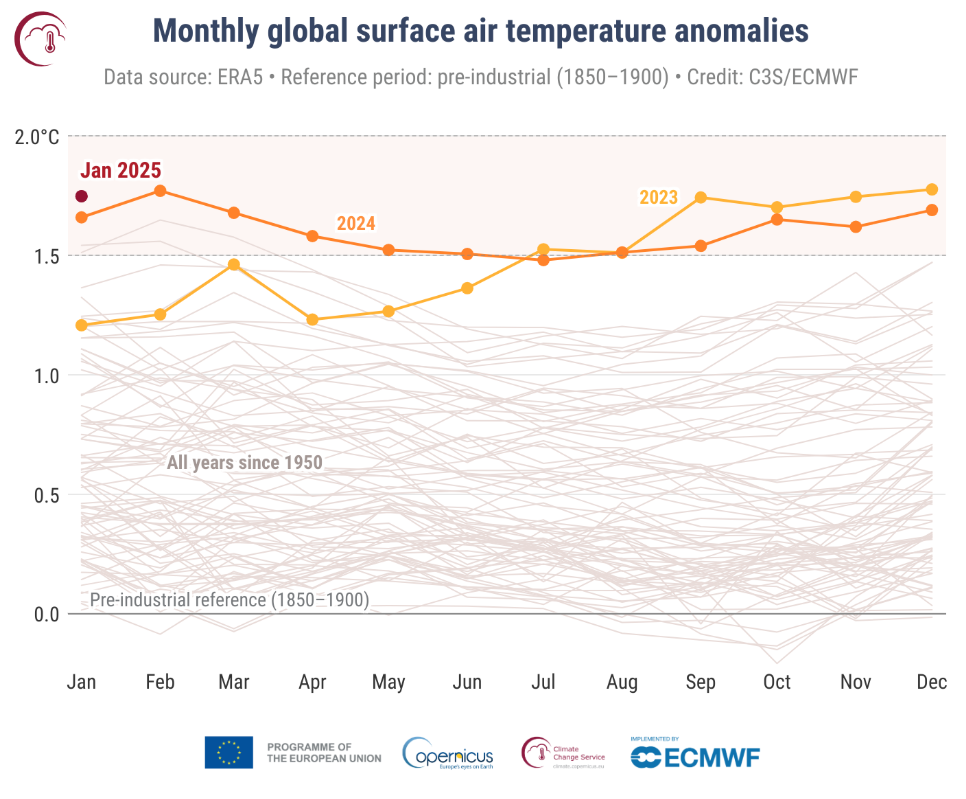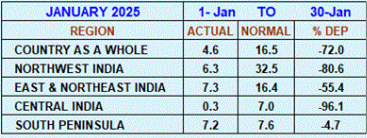2025 records hottest January ever, India witnesses highest mean temperature despite La Nina
Record spike in mercury shows how climate change has overwhelmed the global oceanic phenomenon of La Nina which is known for its cooling effect on global temperatures
By Editorial Desk / Feb 13, 2025

Image Courtesy: The Weather Network
The record-breaking streak continued in January 2025, which was the warmest January globally. The average ERA5 surface air temperature was 13.23°C, 0.79°C above the 1991-2020 average, according to the latest analysis by the Copernicus Climate Change Service (C3S).
The findings were unexpected due to ongoing La Nina conditions in the Pacific Ocean which are invariably related to cooling down the global temperatures. La Nina is the cold phase of El Nino Southern Oscillation (ENSO) when global ocean temperatures tend to be cooler than normal.
According to meteorologists, climate change has overwhelmed the global oceanic phenomenon. “January 2025 is another surprising month, continuing the record temperatures observed throughout the last two years, despite the development of La Niña conditions in the tropical Pacific and their temporary cooling effect on global temperatures,” said Samantha Burgess, Strategic Lead for Climate, The European Centre for Medium-Range Weather Forecasts (ECMWF).
Mahesh Palawat, Vice-President-Meteorology and Climate Change, Skymet Weather, added “The role of global warming has been increasing day by day in the form of rising surface and marine heatwaves. Heatwaves have become more prolonged and stronger which has overpowered the cooling impact of La Nina.”
January 2025 was the second consecutive year to record the warmest January. The impact of super El Nino in 2024 led to extreme temperatures between January and June making them the warmest on record for those months.
According to the Copernicus Climate Change Service (C3S), January 2025 was 1.75°C above the pre-industrial level. This makes it the 18th month in the last 19 months for which the global average surface air temperature was more than 1.5°C above the pre-industrial level.

The last 12-month period (February 2024 – January 2025) was 0.73°C above the 1991-2020 average and 1.61°C above the estimated 1850-1900 average used to define the pre-industrial level.
India in focus
The impact of rising global temperatures also impacted India, which is also struggling with warmer winters this season. In January 2025, India recorded 3rd highest mean temperature at 18.98 degrees Celsius since 1901, which was above average by 0.94 degrees Celsius.
The minimum temperature during January 2025 was also the fifth highest in 124 years. The country recorded night temperature at 12.51 degrees Celsius against the normal of 11.46 degrees Celsius.
The increase in temperatures can be attributed to below-normal rainfall as the country recorded the fourth lowest rainfall since 1901 in January 2025 and the third lowest since 2001.
All the subdivisions were rain deficit during the month. Central India recorded almost no rainfall with 0.3 mm in January, making it a large rain deficit by 96%. This was followed by Northwest India with 80.6% rain deficiency and East & Northeast India with 55.4%.

In the wake of a persistent rise in temperatures, the country’s state-run India Meteorological Department (IMD) has forecasted above-normal maximum and minimum temperatures across the country during February.
February is considered a winter month, however ongoing spike in mercury has made it into a transition month. Present temperatures are already giving a feel of spring season and forecasters have warned that temperatures may reach up to 30 degrees Celsius by the end of February.
Climate Change La Nina Global Warming Hottest January January 2025 Weather in India

